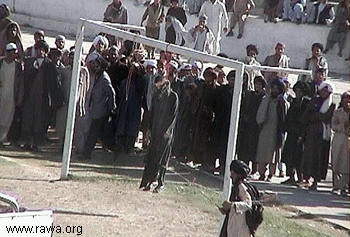KABUL - UN rights chief Louise Arbour criticised Afghanistan Tuesday for stalling on a plan to address atrocities and human rights abuses committed in its more than two decades of armed conflict.

Kabul: Public execution under the Taliban rule on September 23, 2000 (taken by a RAWA hidden camera)

Kabul: Public execution under the Jehadi (Northern Alliance) rule on Sep.7, 1992
Arbour, wrapping up a six-day visit, told reporters little had been done on measures outlined in a three-year peace, reconciliation and justice "action plan" adopted by the government in December last year.
Instead, the plan had been "reduced to the single issue of prosecution of violators of human rights," said Arbour, the United Nations high commissioner for human rights.
Arbour said that "without abandoning the ideal of accountability," victims need to be acknowledged and compensated.
There must be progress on other initiatives to help the country come to terms with its past, including "truth-telling, documentation, compensation ... symbolic recognition of the suffering of the victims," she added.
Many alleged rights violators hold positions of authority in the post-Taliban government of President Hamid Karzai, which critics say undermines public support for the administration.
Suggestions that these "warlords" may have to account for their actions is deeply sensitive.
Arbour said she had also urged Karzai during a meeting to abandon the death penalty. Fifteen prisoners were executed last month in the second known executions since the Taliban government was toppled in 2001.
"In a country where the criminal justice system suffers so many deficiencies, it is particularly problematic to have the death penalty applied in any case," Arbour said.
She also questioned commanders of the NATO-led International Security Assistance Force about the "very alarming" number of civilian casualties in military operations this year.
"I was assured that methods of operation are being reviewed to ensure a reduction of exposure of civilians," she said. About 600 civilians are estimated to have been killed in international military action this year.
Arbour said the government and its international partners were also lagging on efforts to improve the lives of Afghan women, only about 13 percent of whom are literate.
"The provision for 28 percent of seats in parliament to be reserved for women has in fact obscured the fact that they are very absent from virtually all other sectors of public and political life, particularly from the judicial sector," she said.



